标签:输出 app 定义 str 成员函数 reserve 编写 inf clu
编写一个函数:
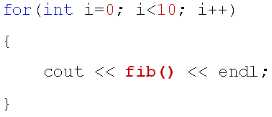
实现功能:
#include <iostream>
#include <string>
using namespace std;
int fib()
{
static int a0 = 0;
static int a1 = 1;
int ret = a1;
a1 = a0 + a1;
a0 = ret;
return ret;
}
int main()
{
for(int i=0; i<10; i++)
{
cout << fib() << endl;
}
cout << endl;
for(int i=0; i<5; i++)
{
cout << fib() << endl;
}
return 0;
}运行结果为:
[root@bogon Desktop]# g++ test.cpp
[root@bogon Desktop]# ./a.out
1
1
2
3
5
8
13
21
34
55
89
144
233
377
610存在的问题——函数一旦开始调用就无法重来:
函数对象:
函数调用操作符(( )):
只能通过类的成员函数重载
可以定义不同参数的多个重载函数
最终解决方案——把类的对象当作函数使用:
#include <iostream>
#include <string>
using namespace std;
class Fib
{
int a0;
int a1;
public:
Fib()
{
a0 = 0;
a1 = 1;
}
Fib(int n)
{
a0 = 0;
a1 = 1;
for(int i=2; i<=n; i++)
{
int t = a1;
a1 = a0 + a1;
a0 = t;
}
}
int operator () ()
{
int ret = a1;
a1 = a0 + a1;
a0 = ret;
return ret;
}
};
int main()
{
Fib fib;
for(int i=0; i<10; i++)
{
cout << fib() << endl;
}
cout << endl;
for(int i=0; i<5; i++)
{
cout << fib() << endl;
}
cout << endl;
Fib fib2(10);
for(int i=0; i<5; i++)
{
cout << fib2() << endl;
}
return 0;
}运行结果为:
[root@bogon Desktop]# g++ test.cpp
[root@bogon Desktop]# ./a.out
1
1
2
3
5
8
13
21
34
55
89
144
233
377
610
55
89
144
233
377什么时候需要重载赋值操作符?编译器是否提供默认的赋值操作?
示例:
#include <iostream>
#include <string>
using namespace std;
class Test
{
int* m_pointer;
public:
Test()
{
m_pointer = NULL;
}
Test(int i)
{
m_pointer = new int(i);
}
Test(const Test& obj)
{
m_pointer = new int(*obj.m_pointer);
}
Test& operator = (const Test& obj)
{
if( this != &obj )
{
delete m_pointer;
m_pointer = new int(*obj.m_pointer);
}
return *this;
}
void print()
{
cout << "m_pointer = " << hex << m_pointer << endl;
}
~Test()
{
delete m_pointer;
}
};
int main()
{
Test t1 = 1;
Test t2;
t2 = t1;
t1.print();
t2.print();
return 0;
}运行结果为:
[root@bogon Desktop]# g++ test.cpp
[root@bogon Desktop]# ./a.out
m_pointer = 0x252f010
m_pointer = 0x252f030(在C语言中支持自赋值,于是C++为了兼容C语言,也得支持自赋值。于是在重载赋值操作符的时候,也得处理自赋值的情况。)
问题分析:
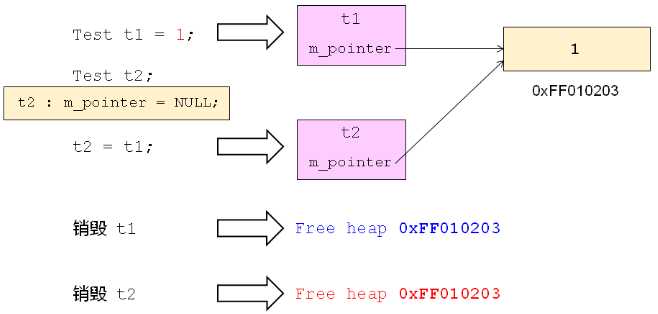
一般性原则:
重载赋值操作符,必然需要实现深拷贝!!!
编译器默认提供的函数:
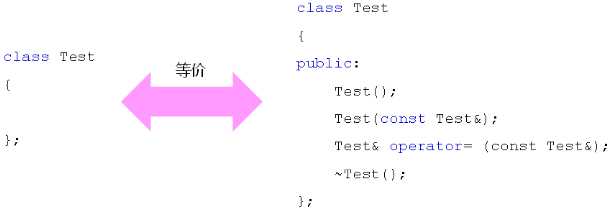
下面的代码输出什么?为什么?
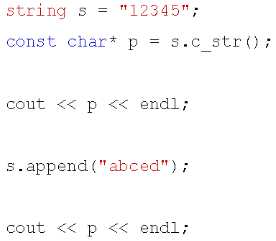
示例:
#include <iostream>
#include <string>
using namespace std;
int main()
{
string s = "12345";
const char* p = s.c_str();
cout << p << endl;
s.append("abced"); // p 成为了野指针
cout << p << endl;
return 0;
}运行结果为:
[root@bogon Desktop]# g++ test.cpp
[root@bogon Desktop]# ./a.out
12345
12345问题分析:
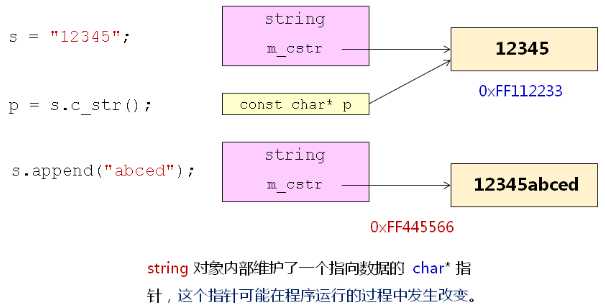
下面的程序输出什么?为什么?
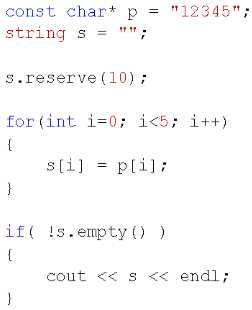
示例:
#include <iostream>
#include <string>
using namespace std;
int main()
{
const char* p = "12345";
string s = "";
s.reserve(10);
// 不要使用 C 语言中的方式操作 C++ 中的字符串
for(int i=0; i<5; i++)
{
s[i] = p[i];
}
cout << s << endl;
for(int i=0; i<5; i++)
{
cout << s[i] << endl;
}
return 0;
}运行结果为空:
[root@bogon Desktop]# g++ test.cpp
[root@bogon Desktop]# ./a.out
1
2
3
4
5问题分析:
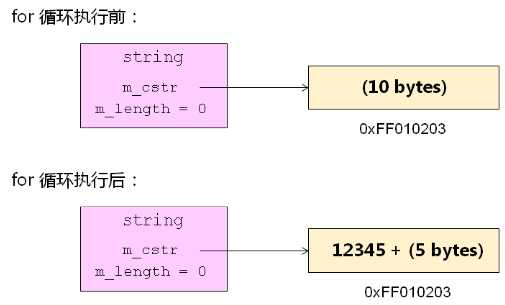
改进后:
#include <iostream>
#include <string>
using namespace std;
int main()
{
const char* p = "12345";
string s = "";
s = p;
cout << s << endl;
return 0;
}运行结果为:
[root@bogon Desktop]# g++ test.cpp
[root@bogon Desktop]# ./a.out
12345标签:输出 app 定义 str 成员函数 reserve 编写 inf clu
原文地址:https://www.cnblogs.com/PyLearn/p/10085642.html